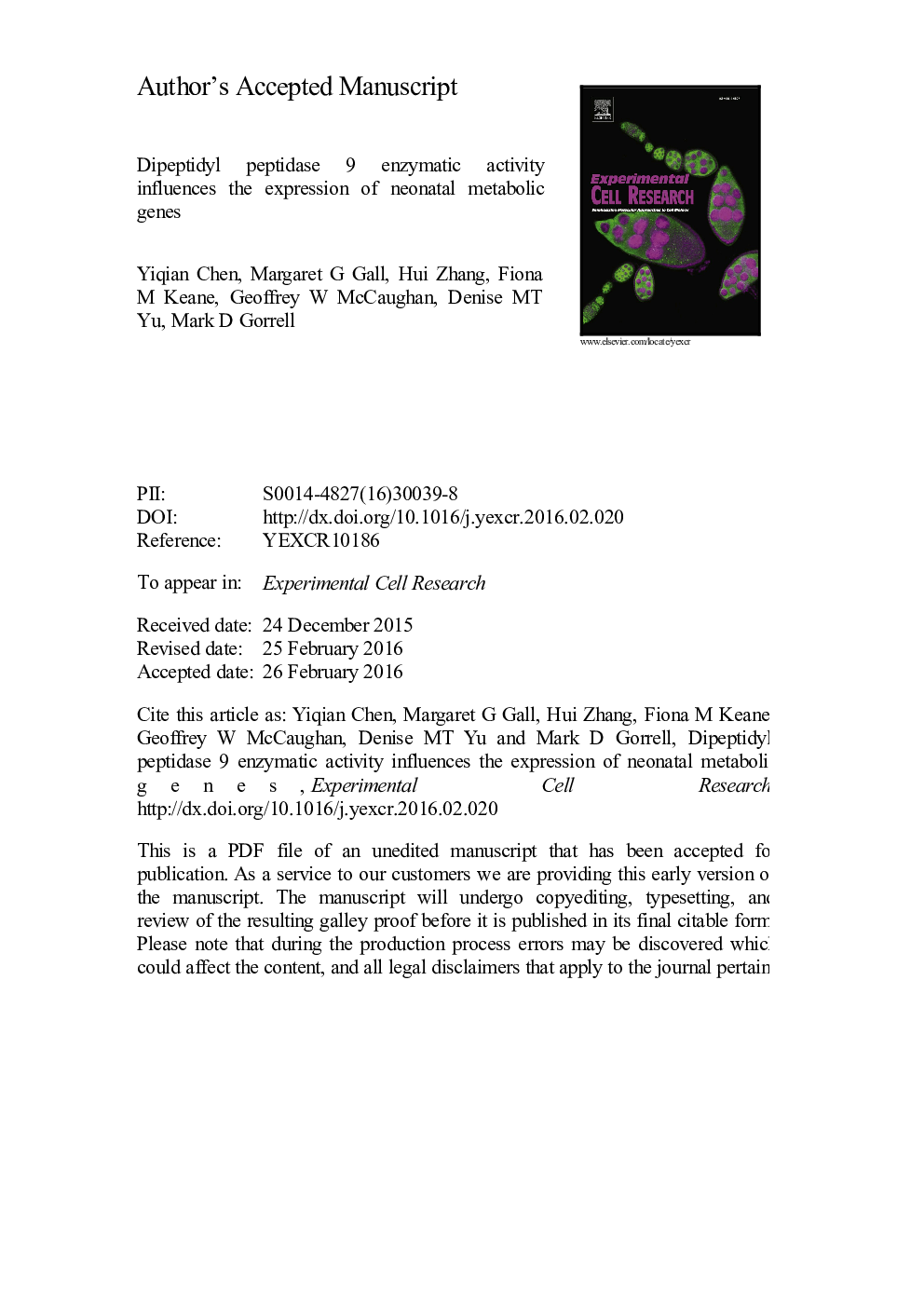| Article ID | Journal | Published Year | Pages | File Type |
|---|---|---|---|---|
| 10903755 | Experimental Cell Research | 2016 | 35 Pages |
Abstract
The success of dipeptidyl peptidase 4 (DPP4) inhibition as a type 2 diabetes therapy has encouraged deeper examination of the post-proline DPP enzymes. DPP9 has been implicated in immunoregulation, disease pathogenesis and metabolism. The DPP9 enzyme-inactive (Dpp9 gene knock-in; Dpp9 gki) mouse displays neonatal lethality, suggesting that DPP9 enzyme activity is essential in neonatal development. Here we present gene expression patterns in these Dpp9 gki neonatal mice. Taqman PCR arrays and sequential qPCR assays on neonatal liver and gut revealed differential expression of genes involved in cell growth, innate immunity and metabolic pathways including long-chain-fatty-acid uptake and esterification, long-chain fatty acyl-CoA binding, trafficking and transport into mitochondria, lipoprotein metabolism, adipokine transport and gluconeogenesis in the Dpp9 gki mice compared to wild type. In a liver cell line, Dpp9 knockdown increased AMP-activated protein kinase phosphorylation, which suggests a potential mechanism. DPP9 protein levels in liver cells were altered by treatment with EGF, HGF, insulin or palmitate, suggesting potential natural DPP9 regulators. These gene expression analyses of a mouse strain deficient in DPP9 enzyme activity show, for the first time, that DPP9 enzyme activity regulates metabolic pathways in neonatal liver and gut.
Keywords
ACADMΔΔCtHNF-4αdiacylglycerol acyltransferase 1DGAT1IGFBP1SREBP-1GKOSCD1comparative CtAMPKG6PCChREBPHGFVEGF-AIκBαGKIGLUT4DPP93-hydroxy-3-methylglutaryl-CoA synthaseperoxisome proliferator-activated receptor γ coactivator-1αacetyl-coenzyme A carboxylase alphaMCFAsacyl-CoA synthetase long-chain family member 1ACSL1Very long chain acyl-CoA dehydrogenasePhosphatidylinositol-3-kinasesCXCL10FABP2PDK4FATP4ACADVLLCFAsAK2C-X-C motif chemokine 10HMGCS2PEPCKDPPSUMOHDLADIPOR2DMEMEGFFOXO1ACCPPARαPI3KIRSIL-1βHMG-CoAIL-1RAFAPPGC-1αEGFR3-Hydroxy-3-methylglutaryl-CoAAMP-activated protein kinasehigh-density lipoproteinHETDulbecco's modified Eagle's mediumVLDLRinterleukin-1 receptor antagonistAktStearoyl-coenzyme A desaturase 1fatty acid synthaseLong-chain fatty acidsMedium-chain fatty acidsinsulin receptor substratetumour necrosis factor αForkhead box O1glucose transporter 4dipeptidyl peptidaseMedium chain acyl-CoA dehydrogenaseepidermal growth factorHepatocyte growth factorsterol regulatory element binding transcription factor 1cytoplasmic extractnuclear extractnon-targetingvascular endothelial growth factor-ATNF-αFasnphosphoenolpyruvate carboxykinaseEndothelial lipaseGene knock-outwild typeheterozygotepopFibroblast activation proteinInsulin-like growth factor-binding protein 1protein kinase Bprolyl oligopeptidasePyruvate dehydrogenase kinase 4carnitine palmitoyltransferase 1asmall ubiquitin-like modifierglucose 6-phosphataseadiponectin receptor 2Epidermal growth factor receptorVery low-density lipoprotein receptorPeroxisome proliferator activated receptor αglucocorticoid receptor
Related Topics
Life Sciences
Biochemistry, Genetics and Molecular Biology
Cancer Research
Authors
Yiqian Chen, Margaret G. Gall, Hui Zhang, Fiona M. Keane, Geoffrey W. McCaughan, Denise M.T. Yu, Mark D. Gorrell,
